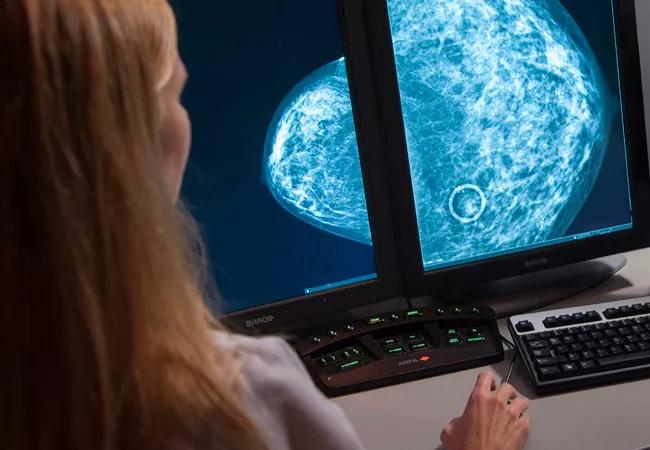Increased invasive disease-free survival, disease-free survival and overall survival

A new option proves effective for patients with HER2+ early breast cancer with residual disease after neoadjuvant therapy. The phase 3 KATHERINE (NCT01772472) trial found that ado-trastuzumab emtansine (T-DM1) increases invasive disease-free survival (IDFS), disease-free survival (DFS) and overall survival (OS) compared with trastuzumab.
Advertisement
Cleveland Clinic is a non-profit academic medical center. Advertising on our site helps support our mission. We do not endorse non-Cleveland Clinic products or services. Policy
“In the past 10 to 15 years, we have developed several new treatment options for HER2+ breast cancer that specifically target the HER2 protein. This evidence will provide a basis for regulatory approval so that we can offer this regularly to our patients,” says Jame Abraham, MD, Director of Breast Oncology at Cleveland Clinic Cancer Center, a participating site in the study. “We found both a significant risk reduction in terms of survival as well as a safety profile consistent with other studies on T-DM1.”
The KATHERINE trial targeted patients with HER2+ breast cancer with residual tumors after preoperative therapy. The international, multicenter, randomized trial found that adjuvant T-DM1 demonstrated both a statistically significant and clinically meaningful improvement in IDFS compared with trastuzumab (unstratified HR = 0.50; 95% CI 0.39-0.64, P < 0.0001). The three-year IDFS rate improved from 77.0 percent to 88.3 percent. The benefit of T-DM1 was consistent across all key subgroups including HR status, extent of residual invasive disease and single or dual HER2-targeted neoadjuvant therapy. Investigators presented the data at the San Antonio Breast Cancer Symposium and published results in the New England Journal of Medicine in December 2018
“The patients studied here often have a worse prognosis,” says Dr. Abraham, “so these results are particularly encouraging.”
Eligibility criteria for patients included histologically confirmed invasive breast carcinoma, completion of HER2-directed therapy and preoperative systemic chemotherapy and at least 18 years of age. An ECOG performance status of 0 or 1, clinical stage, T1-4/N0-3/M0 and adequate renal, liver and hematologic function were also required. Patients were randomized to either intravenous T-DM1 3.6 mg/kg or trastuzumab 6 mg/kg every three weeks for 14 cycles.
Advertisement
While this study found no new safety signals, T-DM1 has been associated with liver and heart toxicity, birth defects and death. It is approved for patients with metastatic HER2+ breast cancer who failed trastuzumab and a taxane.
Patients with metastatic cancer were excluded from the study. Dr. Abraham was principal investigator of a multi-institutional phase 1b clinical trial that found T-DM1 in combination with neratinib effective for these patients.
“This data will likely form the foundation of a new standard of care in this population,” says Dr. Abraham, “and lead to an overall increase in the use of neoadjuvant therapy in HER2+ early breast cancer.”
Advertisement
Advertisement

Combining advanced imaging with targeted therapy in prostate cancer and neuroendocrine tumors

Early results show strong clinical benefit rates

The shifting role of cell therapy and steroids in the relapsed/refractory setting

Radiation therapy helped shrink hand nodules and improve functionality

Standard of care is linked to better outcomes, but disease recurrence and other risk factors often drive alternative approaches

Phase 1 study demonstrates immune response in three quarters of patients with triple-negative breast cancer

Multidisciplinary teams bring pathological and clinical expertise

Genetic variants exist irrespective of family history or other contributing factors